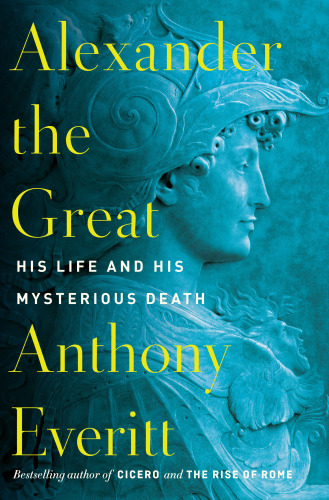
Alexander the Great
His Life and His Mysterious Death
کتاب های مرتبط
- اطلاعات
- نقد و بررسی
- دیدگاه کاربران
نقد و بررسی

June 1, 2019
Everitt (The Rise of Athens: The Story of the World's Greatest Civilization, 2016, etc.) shows us the genius of Alexander (356-323 B.C.E.) in a biography that reads as easily as a novel. In order to provide a full picture of this fascinating figure, the author seamlessly weaves in comments from friends and foes alike, including Demosthenes and Aristotle. Alexander was driven to conquer the impossible, whether it was fording a river or driving his army to India's "river ocean" to see the "world's edge." From the strong influence of his mother, Olympias, and father, Philip, who shifted the balance of power in the Eastern Mediterranean, he received a Greek education and the strength to take over the world. Philip was not cruel but certainly ruthless as he became leader of all Greece, exhibiting how self-government by the defeated could minimize expenses. After Philip's murder (with lots of suspects), the task of invading Persia fell to Alexander. He inherited a large, disciplined army, a wealthy empire, and Philip's military genius, allowing him to quell uprisings. He had no personal ambition but delighted in danger; he was audacious to the point of lunatic courage; he was devoted to his friends, respectful of enemies. Alexander's masterful engineers, artillery, and siege engines, along with his incredible luck, helped as he defeated the Persians time and again. He won the day against the Persians at the Granicus, which made him the leader of Asia Minor. Darius III escaped not once but twice, leading Alexander further into unknown territory. Moving into India, Alexander respected the different cultures and rejected racism, but he alternated chivalry with ferocity. Wartime massacres and total destruction of Thebes, Tyre, and Persepolis were cases of cruel necessity rather than gratuitous cruelty. Celebrations could turn into drunken quarrels and turned his men's respect into fear as they longed for home. Everitt has a wealth of anecdotes and two millennia of histories to work with, and he delivers and interprets them flawlessly. Nearly unparalleled insight into the period and the man make this a story for everyone.
COPYRIGHT(2019) Kirkus Reviews, ALL RIGHTS RESERVED.

June 17, 2019
Ancient history expert Everitt (Cicero) attacks the young Macedonian king’s astonishing conquests on three continents—Africa, Asia, and Europe—with relish. He starts off slow, with lots of background on family and context, but kicks things into gear when Alexander starts marching. Quick-thinking and able to learn from his mistakes, Everitt’s Alexander displays a facility with tactics and strategy on a diverse array of battlefields as well as cleverly meshing Macedonian and local cultures to help him more nimbly govern his extensive empire. Everitt evenhandedly reminds readers of Alexander’s failings, too, such as incredibly dysfunctional family dynamics and a penchant for self-aggrandizing claims (including being the offspring of a deity). Despite increasing paranoia and heavy drinking toward the end of his short life, the battle-scarred leader still commanded incredible loyalty from his army while understanding the boundaries of that loyalty. Everitt carefully discusses the controversy surrounding Alexander’s premature death at age 32, including a convincing probable cause. This detailed account of the intriguing ancient military genius will fascinate military history readers eager to learn more about Alexander’s motivation and the lifelong fearlessness that propelled him to near-mythic status.

July 1, 2019
Everitt (performing & visual arts, Nottingham Trent Univ., England; Cicero) continues his tradition of popular biographies of classical figures, this time featuring Alexander the Great (d. 323 BCE). The enjoyable and highly readable narrative spans the rise of Macedonia in the decades preceding Alexander's birth, the foundations built by his father, Philip II of Macedon, and the young conqueror's staggering successes across multiple continents. Frequent excerpts from classical authors and asides into Hellenic culture provide hooks for beginning readers to explore further. But other details will niggle at more serious readers of the period: Everitt struggles with the difference between xenia (guest-friendship rules enforced by Zeus) and philia (committed love felt between friends) and imputes too much explanatory power to erastes/eromenos relationships (a form of pederasty governed by nuanced social conventions). Yet the only significant flaw is Everitt's emphasis on speculating about Alexander's untimely and surprising death, which he considers compellingly, but his conclusions are ultimately neither novel nor substantiated better than those of other biographers, ancient or modern. VERDICT This work will appeal to fans of "Great Men" biographies, initiates in classical studies, and Everitt's numerous followers. [See Prepub Alert, 2/18/19.]--Evan M. Anderson, Kirkendall P.L., Ankeny, IA
Copyright 2019 Library Journal, LLC Used with permission.

























دیدگاه کاربران